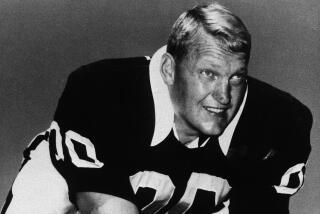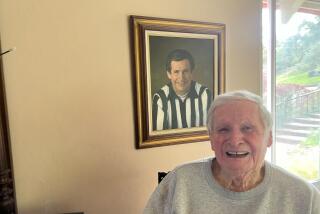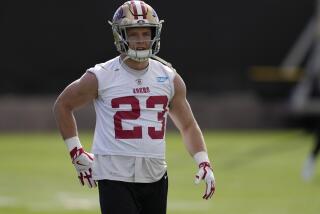Jim Plunkett’s road to Super Bowl champion wasn’t always smooth
Jim Plunkett wanted out, but Al Davis balked.
Otherwise, Plunkett might not have been playing for the Oakland Raiders in the fall of 1980, when the Heisman Trophy winner from Stanford jump-started an improbable career resurrection that culminated in two Super Bowl victories.
“I asked to be traded,” Plunkett says, “and Mr. Davis said no.”
It proved to be one of the most astute decisions made by the Raiders’ oft-criticized owner.
Thirty years ago this week, Plunkett led the Raiders to victory over the Philadelphia Eagles in Super Bowl XV. Three seasons later, he did it again, helping the relocated-to-Los Angeles Raiders defeat the Washington Redskins for the title.
Plunkett, 63, is still involved with the Raiders, co-hosting a team-produced weekly television program, “The Silver and Black Show,” and sitting in Davis’ box during games.
It’s a stark contrast to 1980, when Plunkett longed to leave Oakland in hopes of reinvigorating a fading career.
It had been anything but a happy Bay Area homecoming for the rifle-armed quarterback who first gained widespread notice at San Jose James Lick High. Nearly a decade into his professional career, the No. 1 pick in the 1971 draft had been all but branded an NFL washout, his promising rookie-of-the-year season with the New England Patriots notwithstanding.
Two forgettable seasons with the San Francisco 49ers were followed by two fruitless years with the Raiders, who plucked him from the NFL scrapheap but buried him on the bench.
After two seasons as a backup to Ken Stabler, Plunkett opened the 1980 season backing up newcomer Dan Pastorini, who’d been acquired in a trade for Stabler.
Davis denied his trade request, Plunkett says, because he wanted the veteran available in case of emergency.
Finally, after Pastorini suffered a broken leg in early October, Plunkett was pressed into service. Rallying the Raiders from a 2-3 start, he capped his comeback season by passing for three touchdowns in a most-valuable-player performance in the Super Bowl.
In 1983, Plunkett followed a similar script, this time taking the reins from Marc Wilson at midseason and helping the Raiders to their third — and most recent — NFL title.
“They’re both very important to me,” Plunkett says of his Super Bowl victories, “but the first one, after the resurrection, the struggle, the payoff at the end was quite incredible.”
Life, it seems, has been a struggle for Plunkett.
Born to blind parents, he worked odd jobs to help support his family as a teen and almost was forced to give up football when a cancerous lump was found in his neck during a physical examination before his freshman year at Stanford.
After surgery, Plunkett resumed playing too quickly and performed so poorly on the freshman team that then-Stanford coach John Ralston asked him to switch to defensive end.
Plunkett declined, threatened to transfer and, given a second chance, led Stanford to a Rose Bowl upset of Ohio State to cap his Heisman Trophy-winning senior season.
Five mostly difficult seasons in New England followed, preceding a trade to the 49ers and, in 1978, Plunkett’s outright release.
“It was the low point in my career … really hard to take,” he says of the 49ers’ move. “Physically and mentally, I was not in the best shape. It was very hard to swallow. …
“I had a lot of doubts.”
Friends helped talk him out of retiring and, two weeks later, he signed with the Raiders. Two years after that, Pastorini’s injury gave Plunkett the opportunity he’d long awaited.
“Fortunately,” he says, “I was able to take advantage.”
Tom Flores, then the Raiders coach, was not surprised.
“Our type of system was almost perfect for Jim,” Flores says. “He was tall in the pocket, very powerful, a strong leader. The players liked him. They rallied around him and he just rose to the occasion, making big plays in big games.”
These days, Plunkett and wife Gerry still live in the Bay Area, in Atherton, about a five-minute drive from Stanford.
They delighted last summer in the wedding of their daughter, Meghan, but they’re still mourning the loss of their son, James Jr., who was 25 when he died in November 2008.
“It’s still hard for me to talk about it,” Plunkett says during a phone interview, his voice catching. “I know life goes on … but it’s been devastating.
“I really can’t talk about it.”
Plunkett also carries innumerable physical scars from his playing days. His 15 surgeries have included six on his left shoulder, one on his right shoulder, two on his neck and six on his knees.
After having both knees replaced a few years ago, he says, “I’m in less pain. But I have a terrible back … and my left shoulder really doesn’t work too well.”
Still, he remains active at Stanford, regularly attending events on campus and raising money for athletic scholarships through his annual charity golf tournament. He also sits on the board at the Vista Center for the Blind and Visually Impaired in Palo Alto, supporting a cause close to his heart.
Friends and family, meanwhile, wonder why the Pro Football Hall of Fame has snubbed him. He is the only eligible two-time Super Bowl-winning quarterback who has not been voted in.
“I do feel somewhat slighted,” Plunkett says. “I took a tough road to get where I finally got.”
More to Read
Go beyond the scoreboard
Get the latest on L.A.'s teams in the daily Sports Report newsletter.
You may occasionally receive promotional content from the Los Angeles Times.










